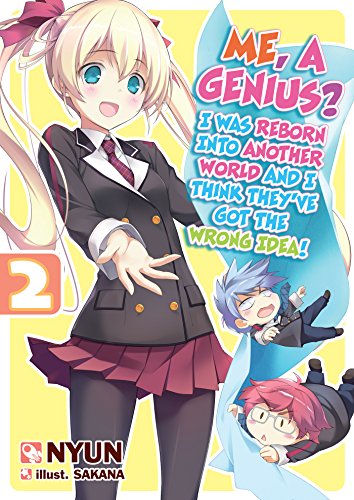By Nyun and Sakana. Released in Japan as “Isekai ni Tensei Shitandakedo Ore, Tensai tte Kanchigai Saretenai?” by Overlap, Inc. Released in North America digitally by J-Novel Club. Translated by Shaun Cook.
I’m afraid that there’s a bit of a sophomore slump with this second volume. It was always going to be hard to keep the lightning in the bottle, but I think the author may have changed things up a bit TOO much. Most of the events and places that we were introduced to in the first book are jettisoned, including his school and friends – yes, even Alice, despite being the main cover girl for the second time, barely appears – and instead Kouki’s parents, realizing that eventually the world is going to have to do something about their son that everyone assumes is an amoral monster, decide it’s for the best to move. With 100,000 of their colleagues. To another universe. Because even though most of the actual plot of the first book is abandoned for this second book, the basic premise remains the same – everyone thinks they’re the only same person in the room, and everyone is wrong – they’re all over the top out of their gourds.
The reason they’re able to do the universe move is, for once, not because of some invention of Kouki’s, but because they’re investigating ruins on the moon and Kouki does what no one else has been able to, which is figuring out the hieroglyphics that are they key to get inside. There they meet an alien who gives them a device to look over other worlds. Sadly, the world they end up choosing has its own issues, and so while the first book in this series is science fiction of a sort, this is more playing with isekai fantasy. Of course, Kouki and his family are still who they are, and so they proceed to do laughable stuff that it’s impossible for the reader to take seriously and pass it off as obvious. There are still some very good jokes, such as when Miki realizes that Kouki has somehow learned magic, and her solution is “I’ll just learn it too so I can say I taught him”.
It’s become increasingly clear why this alternate universe Kouki was reincarnated in is like this – it has no casual fiction. No manga, anime, fantasy, video games, etc. This is why people stare in horror when Kouki does things that are what a casual teenage otaku might want to do after seeing an episode of your average sentai show and having unlimited access to the tech that can achieve it. Unfortunately, the actual writing itself still lacks focus – the changing viewpoints are clever, but they also mean that we flit from location to location at times, never really getting time to settle down and like any of these people. As the hero, Kouki fares best, and his emotional breakdown about the horror of war near the end wasn’t horrible, but I did feel that it hadn’t really been earned.
The series ends with the third volume, and I’m not sure if it’s got a real ending or an “open ending because who knows, maybe sales will perk up again” ending. Given it’s only three volumes, I’m going to read the next one, especially to see if they resolve the Alice subplot they mentioned and forgot in Vol. 1, and which doesn’t come up at all here. Till then, this is still goofy fun, but doesn’t really stick with you too much after reading.

